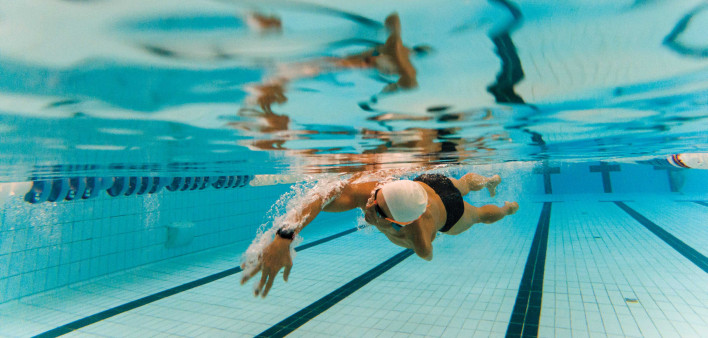Some Texans recently took to Facebook to spread rumors about HIV and AIDS spreading in a community swimming pool. To be clear, no cases of HIV transmission via swimming pools have ever been recorded, according to the University of Rochester Medical Center.
The Facebook post read: “HOA [homeowners association] Pool Infected with AIDS. 4th person positive. 4th person tested positive this week. Make sure everyone that visited this pool gets checked. The pool wasn’t cared for and chemicals were not used.”
While the exact location was not disclosed, the area circled on a map is in Arlington, Texas.
The Texas Department of State Health Services received a complaint on April 29 about an HOA pool’s allegedly link to positive HIV results, according to Reuters, which fact-checked the allegation. An inspection found no unsanitary conditions in the pool water or on the pool deck.
Misinformation surrounding HIV transmission has circulated since the epidemic emerged in the early 1980s. In the United States, HIV is most commonly passed from person to person via sexual contact involving the exchange of certain body fluids. Untreated, HIV can progress to AIDS.
Not only is HIV not transmitted via swimming pools, but the chemicals added to the water help protect against the spread of other pathogens. “Chlorine kills germs found in blood (such as hepatitis B and HIV)," says the Centers for Disease Control and Prevention (CDC) on its website. “CDC is not aware of any instances in which a person has become infected with bloodborne germs after being exposed to a blood spill in a pool.”
HIV can neither survive for very long nor reproduce outside the body.
For more details, check out the POZ Basics on HIV Transmission and Risk. It notes that HIV is transmitted through the following body fluids:
- Blood
- Semen
- Pre-cum
- Rectal fluids
- Vaginal fluids
- Breast milk.
This can happen in several ways:
- From condomless vaginal/frontal or anal sex with someone who has HIV while not using a condom or not using medicines to prevent—that is, pre-exposure prophylaxis (PrEP) or post-exposure prophylaxis (PEP) or to treat HIV (Undetectable Equals Untransmittable, or U=U).
- From sharing needles, syringes or other injection equipment with someone who has HIV while not using PrEP.
- From mother to child during pregnancy, childbirth or breastfeeding. However, if the mother is in regular care and on HIV treatment, this risk is reduced to nearly zero.
- From being stuck with a needle or cut with a sharp object that contains HIV-positive blood. This is mostly a risk for health care workers.
- From getting a blood transfusion. However, this risk is rare in the United States.
HIV is not transmitted though saliva, urine, feces, vomit, sweat, animals, bugs or the air. Therefore, you are NOT at risk for HIV if you:
- Are bitten by a mosquito or any other bug or animal.
- Are near a person who is HIV positive and sneezed.
- Eat food handled, prepared or served by a person who is HIV positive.
- Share toilets, telephones or clothing with a person who is HIV positive.
- Share forks, spoons, knives or drinking glasses with a person who is HIV positive.
- Touch, hug or kiss a person who is HIV positive.
- Attend school, church, restaurants, shopping malls or other public places where there are people who are HIV positive.
The City of Arlington has not shared any health advisories or news on its website regarding an outbreak, according to Reuters. The false Facebook post emphasizes the need for increased awareness surrounding HIV and AIDS in the United States.
In related news, Oprah Winfrey received a Vanguard Award earlier this year at the 35th annual GLAAD Media Awards honoring LGBTQ representation in the media. As a longtime queer ally, Winfrey recounted how she used The Oprah Winfrey Show (1986–2011) to educate audiences on the medical facts about HIV, including episodes addressing individuals’ fear of HIV-positive people using public swimming pools.
To combat false information and spread knowledge regarding the virus, several federal agencies have developed public awareness and education campaigns about HIV prevention, treatment and care. Click here for a list of 2024 HIV and AIDS Awareness Days.
Coming up this month:
HIV Vaccine Awareness Day (May 18)
#HVAD
Led by the National Institute of Allergy and Infectious Diseases, HVAD showcases the progress made in the search for a safe and effective HIV vaccine. It also marks an opportunity to educate communities about the importance of vaccine research.
National Asian & Pacific Islander HIV/AIDS Awareness Day (May 19)
#APIMay19
This awareness day presents an opportunity to highlight how HIV uniquely affects Asians and Pacific Islanders. The goal is to promote HIV testing and treatment and encourage conversations about HIV in these communities.
Click #Awareness or #Transmission to learn more. There, you’ll find headlines such as “At Least 3 Women Contracted HIV From Vampire Facials, Confirms CDC,” “WHO Reaffirms Treatment Is Prevention” and “HIV Transmission Virtually Eliminated in Inner Sydney, Australia.”







Comments
Comments